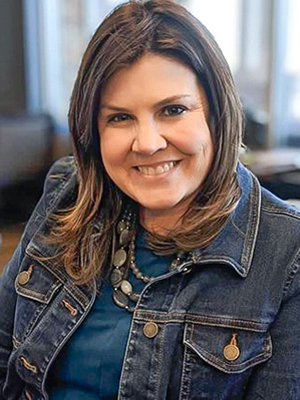KIM NEWCOMER’S TROUBLE BEGAN IN JANUARY 2008 with severe constipation. The 34-year-old had been on a weeklong vacation with her husband and figured that travel and unusual food were to blame. She visited her primary care doctor, who ordered an X-ray to check for an intestinal blockage. Finding none, he prescribed laxatives. But Newcomer’s constipation continued. As the months passed, she developed rectal bleeding and pencil-thin stools. She saw multiple doctors in the practice, hoping for relief.
That summer, Newcomer developed a cough she couldn’t shake. An X-ray to check for pneumonia revealed five nodules in her lungs, which were suspected metastases. Doctors ultimately found a large 9-centimeter tumor in her rectum. In November 2008, more than 11 months after her first visit to the doctor, Newcomer was diagnosed with stage IV rectal cancer.

Kim Newcomer
The diagnosis shocked her, in part because she felt she was more aware of colorectal cancer than most people. Her father was a colon cancer survivor, diagnosed with stage I disease at age 46. “I was 12 when my father was diagnosed, and I was such a huge advocate for screening,” she recalls. “I always knew I had to be screened at 35 for colorectal cancer.”
She had mentioned her father’s cancer to her doctors, but she says they dismissed her concerns; she didn’t fit the profile of a typical colorectal cancer patient. The average age of onset for colorectal cancer is 66 for women and 69 for men, and risk factors for colorectal cancer include a sedentary lifestyle and being overweight or obese. Newcomer was in her 30s. She was lean and fit, and training for a half-marathon. “They just kept telling me that I was too healthy to have cancer,” she remembers.
In December 2008, Newcomer began 12 rounds of chemotherapy with FOLFOX and Avastin (bevacizumab). Her doctors didn’t think surgery was a good idea, but as the tumor in her rectum got smaller, Newcomer, who lived in Minnesota at the time, sought a second opinion at the University of Minnesota Masonic Cancer Center in Minneapolis. She went on to have radiation; a series of surgeries to remove the tumor in her rectum and a large portion of her colon, as well as the tumors in her lungs; and a temporary ileostomy. Subsequently, she experienced a period when she had no evidence of disease, but then new tumors appeared in her lungs.
Over the next few years, she had nine lung surgeries and more than 100 rounds of chemotherapy, in addition to radiation treatment. But Newcomer, who now lives in Milton, Wisconsin, has shown no evidence of disease since 2012. She joyfully celebrated her 50th birthday in February 2023 and serves as senior manager of medical advocacy and community engagement for the Colorectal Cancer Alliance. She is committed to providing resources to help other early-onset colorectal cancer patients.
An Alarming Rise
Stories like Newcomer’s are increasingly common. Statistics released in 2020 by the American Cancer Society show the rate of colorectal cancer in patients 65 or older in the U.S. dropped 3.3% each year from 2012 to 2016, while the rate of colorectal cancer in people under 50—called early-onset or young-onset colorectal cancer—rose 2.2% annually. One study projected that among people 20 to 34, colorectal cancer cases will increase 90% and rectal cancer cases 124.2% by 2030. And a 2021 study published in JAMA Network Open predicted that by 2030, colorectal cancer will be the leading cause of cancer death in people ages 20 to 49.
“If you were born in 1990, you have an almost three times higher risk of developing colorectal cancer than if you were born in say 1955 or 1960,” says Christopher Lieu, co-director of gastrointestinal medical oncology at the University of Colorado Cancer Center in Aurora. Young-onset colorectal cancer is “still a rare event,” he says, but because the disease is often overlooked in this age group, many young adults have advanced disease when they are finally diagnosed.
This rise in colorectal cancer cases led the U.S. Preventive Services Task Force in 2021 to change the recommended age to start colorectal cancer screening from 50 to 45, a move praised by many oncologists. “I was pleased that they extended the screening, but every patient I saw this past week was under 45,” says John L. Marshall, chief of the hematology/oncology division at the Lombardi Comprehensive Cancer Center at Georgetown University in Washington, D.C.
Important questions remain unanswered. What is causing the uptick in cases? Does the disease differ in younger patients? “We need to figure out what the heck is going on and begin to assess and intervene,” Marshall says. “We are almost in a sprint to try and figure this out because it’s not getting better.”
What Colorectal Cancer Looks Like in Early-onset Patients
Cathy Eng, a gastrointestinal medical oncologist who currently directs the Young Adults With Cancer Program at Vanderbilt-Ingram Cancer Center in Nashville, Tennessee, was treating patients at the University of Texas MD Anderson Cancer Center in Houston more than a decade ago when she noticed a growing number of seemingly robust young adults with advanced colorectal cancer diagnoses.
“They were either not married, starting a family or a new career, or getting a new degree, hitting some pivotal milestone in their life. And yet here they were, faced with cancer,” Eng says. Many had stage IV disease. A few had Lynch syndrome or other hereditary conditions that explained their cancer diagnosis, but most cases had no known link to an inheritable genetic predisposition. Eng and Lieu, who had worked with Eng at MD Anderson, conducted a 2014 analysis of an international patient database suggesting that early-onset colorectal cancer was indeed on the rise, a finding confirmed in multiple studies since then.
Genetic mutations and tumor biomarkers are important to understanding a cancer and how to treat it.
After a patient is diagnosed with cancer, their medical team may perform tests to determine if their tumor has genetic mutations or biomarkers that would allow doctors to refine treatment.
Physicians routinely test tumor tissue from patients with colorectal cancer to look for microsatellite stability. Oncologist Christopher Lieu, co-director of gastrointestinal medical oncology at the University of Colorado Cancer Center in Aurora, describes this as a “DNA spellchecker,” which identifies and then repairs errors in DNA.
If this mechanism is broken, the tumor is considered microsatellite instability high, or MSI‑high, increasing the number of genetic mutations in the cancer cells, says Lieu. Emerging research suggests that patients with colorectal cancer that is MSI-high may benefit from immunotherapy treatment. Patients whose tumors are MSI-high may also have a genetic predisposition, known as Lynch syndrome, which increases the risk of developing several cancers.
Physicians could also check for circulating tumor DNA using a blood test to detect residual cancer cells. The test, which is currently being studied in clinical trials, could be administered after a patient completes treatment or to assess whether treatments are working.
Researchers are working to understand the unique characteristics of early-onset colorectal cancer. People under 50 are more likely to have colon cancer on the left side of their body or in the rectum than older adults, Eng says. When young adults’ colorectal tumor tissue is examined under a microscope, “there’s a higher incidence of poor differentiation,” which means the cancer tends to grow and spread more quickly, Lieu says.
The conventional wisdom about colorectal cancer is that it’s slow growing; most cases begin with benign polyps in the colon or rectum that take 10 years or more to develop into cancer, Marshall explains. But “increasingly, we recognize that there are variations,” he says. “Not all cancers start as a benign polyp that hangs out for a bunch of years. There can be a much more rapid transition.”
What’s Driving the Increase?
Researchers do not yet understand what has triggered the uptick in early-onset colorectal cancer, but they are studying multiple theories. One area of focus is the microbiome, the community of microorganisms that live in and on the body and affect health, including the immune system. Some evidence suggests that a bacterial imbalance is linked to colorectal cancer, and medical oncologist Benjamin Weinberg of Lombardi Comprehensive Cancer Center at Georgetown is currently conducting a study to compare the bacteria that live within colon and rectal cancer samples in younger and older patients.
Researchers are also intrigued by associations between antibiotic use and increased colorectal cancer risk. For example, two large studies of medical records in the U.K. and Sweden found that antibiotic use was linked to increased risk of colon cancer, but not rectal cancer. Both studies found that the more antibiotics a person had taken, the higher their risk of developing colon cancer.
Other researchers have examined data from the Nurses’ Health Study, which uses questionnaires about diet and lifestyle to assess risk for chronic diseases. “Using that cohort, we’ve been able to identify several risk factors commonly associated with colorectal cancer, no matter what age you are, that have also been found to be associated with a higher risk of developing young-onset cancer,” says Kimmie Ng, a medical oncologist and director of Dana-Farber’s Young-Onset Colorectal Cancer Center in Boston. “This includes obesity, sedentary behavior, sugar-sweetened beverages and vitamin D deficiency,” Ng says. Eng of Vanderbilt believes it’s likely that researchers will ultimately find an interplay of different factors at work in the surge of early‑onset colorectal cancer cases.
Misconceptions Lead to Delays

Jenna Scott Photo by Michael Humphrey from M. Humphrey Photography
Despite uncertainty around the causes of young‑onset colorectal cancer cases, one thing is clear: Diagnosis for young people often takes a long time. For example, Lieu and colleagues published a 2020 study in Colorectal Cancer that identified 209 people with young-onset colorectal cancer in the University of Colorado Cancer Center Registry and found that, of the 51% of patients who experienced rectal bleeding before their diagnosis, the average time from the onset of bleeding to diagnosis was 180 days, or roughly six months.
Young people often dismiss rectal bleeding. “I would say 85% or 90% of the time, patients think it’s just a hemorrhoid,” Eng says.
Doctors can dismiss these signs too. Jenna Scott of Peachtree Corners, Georgia, was 31, and seven months pregnant with her first child, when she began experiencing rectal and vaginal bleeding, as well as diarrhea and cramping. “My obstetrician said that these are just things that come along with being pregnant,” she recalls.
When Scott’s symptoms continued after her son Cameron was born in June 2016, her obstetrician switched her to a new form of birth control. At her mother’s urging, Scott decided to see a primary care physician. “He actually listened to me,” Scott remembers. He referred her to a gastroenterologist. Roughly a year after her son was born, Scott had a colonoscopy, which revealed a malignant tumor in her sigmoid colon, the S-shaped portion that connects to the rectum. She had stage IV disease that had metastasized to her liver.
With a baby at home, Scott began a chemotherapy regimen of FOLFOX with Avastin, which involved infusions every two weeks that took hours to complete. After six treatments, she had surgery to remove a foot of her colon, portions of her liver, and her gallbladder.
Scott continued treatments to keep tumor growth at bay until October 2021, when her medical team agreed to give her a chemotherapy holiday. Scott was eager for the break, hoping it would help her keep up with her active young son. But in December 2022, she learned that her cancer had spread to the lymph nodes in her chest, and she started more chemotherapy treatment and targeted therapy.
Different Needs in Early-onset Patients
People who have early-onset colorectal cancer grapple with unique challenges, including potential risks to their fertility and sexual health. The extensive radiation used to treat her rectal cancer left Newcomer unable to have children and permanently altered her sexual function. In her work for the Colorectal Cancer Alliance, Newcomer aims to educate young people diagnosed with colorectal cancer about the things she wishes she had known, including options for egg freezing before treatment, using medical devices known as dilators to protect vaginal tissues after radiation, and pursuing pelvic floor therapy. “It’s about knowing your options and going for those second opinions and being just very active in your diagnosis and your treatment plan,” she says.
As the cases of early-onset colorectal cancer increase, physicians are increasingly open to adjustments to treatment, given that side effects often have life-altering consequences. “Young people with colorectal cancer have been really driving the movement for organ preservation, to try to develop regimens that don’t involve radiation or ostomies,” says Marshall, of Georgetown.
Some hospitals have established multidisciplinary specialty clinics devoted to these patients. For example, Ng founded the Young-Onset Colorectal Cancer Center at Dana-Farber in March 2019 to better address the range of issues these patients face. “Right up front, we offer information about services like fertility preservation, sexual health counseling, nutrition counseling, social work support and palliative care,” Ng explains.
Young patients often juggle a lot. “A 35-year‑old may be working full-time and needs to keep working and is the parent of two toddlers, so there’s a level of complexity,” says Marshall. And young patients often face financial toxicity, which can include both indirect and direct costs related to their care.
Newcomer and Scott both share their stories with others. They participate in Colorectal Cancer Alliance’s Never Too Young program, which supports early-onset colorectal cancer patients. Scott can see how it helps patients to hear from another young person with the disease. Newcomer believes sharing information can help young people make more informed decisions about care.
“I don’t want another patient to not have the resources,” Newcomer says. “No patient should ever have to lose sexual function or should ever not be able to be a parent because they did not have a simple conversation.”
Cancer Today magazine is free to cancer patients, survivors and caregivers who live in the U.S. Subscribe here to receive four issues per year.





